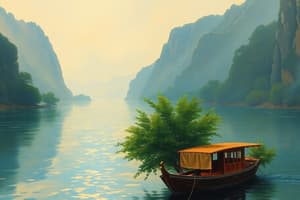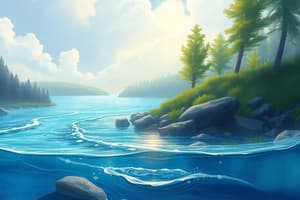Podcast
Questions and Answers
What process involves water droplets becoming too heavy to remain suspended, leading to rain, snow, sleet, or hail?
What process involves water droplets becoming too heavy to remain suspended, leading to rain, snow, sleet, or hail?
- Evaporation
- Precipitation (correct)
- Condensation
- Infiltration
Which factor determines whether precipitation will fall as snow or rain?
Which factor determines whether precipitation will fall as snow or rain?
- Atmospheric pressure
- Air humidity
- Temperature (correct)
- Wind speed
What is the primary function of rivers in the water cycle?
What is the primary function of rivers in the water cycle?
- Regulating global temperatures
- Transporting water from high to low elevation areas (correct)
- Generating hydroelectric power
- Supporting marine life
Which ocean is known for its role in absorbing CO₂ emissions and supporting marine life?
Which ocean is known for its role in absorbing CO₂ emissions and supporting marine life?
How do oceans help distribute warmth and nutrients throughout the world?
How do oceans help distribute warmth and nutrients throughout the world?
What plays a significant role in replenishing groundwater sources and maintaining soil moisture?
What plays a significant role in replenishing groundwater sources and maintaining soil moisture?
What is the primary process that causes humidity in the air and contributes to cloud formation in the water cycle?
What is the primary process that causes humidity in the air and contributes to cloud formation in the water cycle?
Which process in the water cycle involves water vapor changing back into liquid droplets to form clouds?
Which process in the water cycle involves water vapor changing back into liquid droplets to form clouds?
How does precipitation play a role in the water cycle?
How does precipitation play a role in the water cycle?
Which component of geography is responsible for influencing climate patterns and providing essential resources for life on Earth?
Which component of geography is responsible for influencing climate patterns and providing essential resources for life on Earth?
In the context of the water cycle, what role does evaporation play?
In the context of the water cycle, what role does evaporation play?
Why is understanding the water cycle important according to the text?
Why is understanding the water cycle important according to the text?
Flashcards are hidden until you start studying
Study Notes
Geography: Water Cycle, Rivers, Oceans
Overview
Understanding geography is crucial for comprehending our planet's natural systems and their interactions. Three essential aspects of geography are the water cycle, rivers, and oceans. These components play vital roles in shaping our environment, influencing climate patterns, and providing resources necessary for life. This article will delve into the intricate relationships between these elements, shedding light on their importance and significance.
The Water Cycle
The water cycle, also known as the hydrologic cycle, refers to the continuous process by which water circulates through Earth's atmosphere, oceans, and land as precipitation, evaporation, and runoff. Key processes involved in the water cycle include evaporation, condensation, precipitation, and infiltration. Understanding the water cycle is critical because it affects climate, weather patterns, and freshwater availability.
Evaporation
Evaporation occurs when water transforms from liquid to vapor due to heat energy. This process takes place primarily over bodies of open water, like lakes, oceans, and rivers, as well as wet surfaces exposed to sunlight. Evaporation causes humidity in the air, which contributes to cloud formation.
Condensation
Condensation is the opposite process of evaporation, where water vapor changes back into liquid droplets. This transformation happens when warm air rises and cools down, causing moisture to condense and form clouds. Clouds can eventually release this moisture through precipitation, starting the water cycle again.
Precipitation
Precipitation includes rain, snow, sleet, and hail, which occur when water droplets become too heavy to remain suspended in the atmosphere. The type of precipitation depends on temperature and atmospheric conditions. For example, if it's cold enough, precipitation may fall as snow instead of rain.
Infiltration
Infiltration is the process by which water seeps into the ground. It plays a significant role in replenishing groundwater sources and maintaining soil moisture. Over time, infiltrated water becomes part of the underground aquifer, supplying fresh water to springs, wells, and other surface water sources.
Rivers
Rivers are an integral component of the water cycle, connecting various parts of the earth's surface. They transport water from mountainous regions to lower-elevation areas, playing a crucial role in supporting vegetation and wildlife habitats along their paths. Additionally, many rivers are used for recreational activities, irrigation, and hydroelectric power generation. Some key features of rivers include meandering channels, flooding events, and tributaries that feed into larger river systems.
Oceans
Oceans cover approximately 71% of Earth's surface and play a central role in regulating global temperatures, absorbing CO₂ emissions, and supporting marine life. There are five main oceans—Atlantic, Pacific, Indian, Southern, and Arctic—each with unique characteristics determined by factors such as location, depth, and temperature. Ocean currents help distribute warmth and nutrients throughout the world's waters, impacting weather patterns and ecosystems alike.
In summary, understanding the water cycle, rivers, and oceans is essential for appreciating Earth's complex geographical systems. Each element influences the others, creating a delicate balance that sustains life on our planet. Further exploration into these topics can deepen our comprehension of the world around us and inspire conservation efforts to protect these valuable resources.
Studying That Suits You
Use AI to generate personalized quizzes and flashcards to suit your learning preferences.




